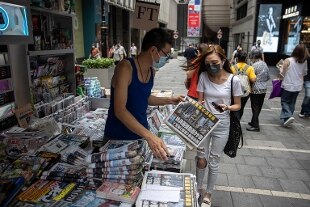Arrests in Hong Kong, US warning in defense of media freedom
Blitz in Apple Daily offices, Hong Kong: pro-democracy editor and editor-in-chief arrested
Share
June 18, 2021 Copies of Apple Daily, Hong Kong's pro-democracy tabloid, have been snapped up despite the monstrous number of 500,000 units in newsstands, instead of the traditional 80,000.
In the aftermath of the police blitz with 500 agents in the newspaper's editorial office and the arrests of its director Ryan Law and the top management of the Next Digital publishing company, the inhabitants of the former colony expressed their solidarity for a spectacular action that puts I risk the freedom of the press, part of an investigation to see if some items were a threat to Chinese national security.
The popular newspaper founded 26 years ago by Jimmy Lai, in prison since the end of 2020, combines interventions in favor of democracy with gossip about celebrities and investigations against those in power: some newsstands in the center have already published the sold out ad for the Apple Daily.
The police, in addition to the 5 arrests, have frozen assets worth 2.3 million dollars of assets owned by three companies linked to the newspaper.
Yesterday's blitz was the second in the tabloid's editorial staff, after the one carried out last year with the arrest of tycoon Jimmy Lai, pro-democracy activist and staunch critic of Beijing, owner of Next Digital which publishes the Apple Daily. Also this time the newspaper sent a similar number of copies to print to the one following Lai's arrest in August 2020.
Today's front page reported the raid with the 500 agents, noting the seizure of 44 memory disks as evidence and the investigation that, for the first time, targets media articles as potentially in violation of the national security law, imposed by Beijing in June 2020 in response to the mass pro-democracy protests of 2019.
The EU and Britain criticized the raid, a confirmation of how China is using the law to crack down on dissent rather than concern itself with public safety, while the US said "selective" use of the law has taken to "arbitrarily" target independent media.

